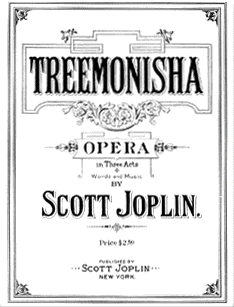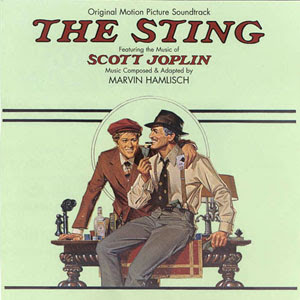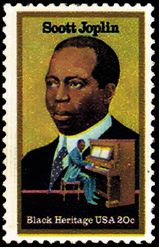
Scott Joplin (c. November 24, 1868, near Linden, TX - April 1, 1917, New York, NY) remains the best-known ragtime figure and is regarded as one of the three most important composers of classic ragtime, along with James Scott and Joseph Lamb.
He was born to Florence Givins and Giles or Jiles Joplin. After 1871, the Joplins moved to Texarkana, Texas, and the mother cleaned homes so Scott could have a place to practice piano, which they had purchased.
The young Joplin received free piano lessons from Julius Weiss. At the 1893 World's Fair (Chicago, Illinois, Scott heard tthe concert band of John Phillip Sousa. Joplin attended George R. Smith College in Sedalia, MI.
By the late 1880's, Joplin was playing first cornet in the Queen City Concert Band. After organizing The Texas Medley Quartette, he helped them to sing their way to, and back from, Syracuse, New York. He was part of a minstrel troupe in Texarkana about 1891.
Despite all his traveling, Joplin's home was in Sedalia, to which he moved in 1894, working as a pianist in the Maple Leaf and the Black 400, social clubs for "respectable [black] gentlemen."
Joplin was in Syracuse in 1895, selling two songs, Please Say You Will and A Picture of Her Face. These were followed the next year by Great Crush Collision, Combination March, and Harmony Club Waltz.
In 1898, a newspaper in Sedalia referred to him as "one of the best pianists in the world."
By 1899 Joplin had sold the above five, plus Original Rags (1899) arranged by Charles N. Daniels.
***
1868Joplin1899MapleLeafRag
Maple Leaf Rag (1899)
(Performed by Scott Joplin, on a piano roll)
(Performed by Jelly Roll Morton, in swing style)
In 1899, Joplin sold what would become one of his most famous pieces, Maple Leaf Rag, to John Stark & Son, a Sedalia music publisher, and received a one-cent royalty for each copy and ten free copies for his own use, as well as an advance. It has been estimated that Joplin made $360 per year on this piece in his lifetime.
Upon publication, Stark noted that the rags had obtained classical status, and that the composer "lifted ragtime from its low estate and lined it up with Beethoven and Bach."
Joplin combined the traditions of Afro-American folk music with 19th-century European romanticism; he collected the black Midwestern Folk rag ideas as raw material for the creation of original strains. Thus, his rags are the most heavily pentatonic, with liberal use of blue notes and other outstanding features that characterize black folk music. In this creative synthesis, . . . the traditional march became the dominant form, and the result was a new art form, the Classic rag – a unique conception which paradoxically both forged the way for early serious ragtime composition, and, at the same time, developed along insular lines, away from most other ragtime playing and composing.
The composer left little doubt as to how his works should be performed: as a precaution against the prevailing tendency of the day to up the tempo, he explicitly wrote in many of his scores that "ragtime should never be played fast." According to Joplin biographer Rudi Blesh, Joplin's injunction needs to be read in the light of his time, when a whole school of "speed" players were ruining the fine rags. Joplin's concept of "slow" was probably relative to the destructive prestos of his day.
Joplin made seven piano rolls in 1916: Maple Leaf Rag, Something Doing, Magnetic Rag, Ole Miss Rag, Weeping Willow Rag and Pleasant Moments: Ragtime Waltz -- for Connorized and Aeolian companies.
Maple Leaf Rag - performed by Scott Joplin
The rolls are interesting for the embellishments added by Joplin to his Connorized performances, although studying other Connorized rolls of that era reveals they may well have been added during the production process by staff artists, rather than Joplin himself.
It has been claimed that the uneven nature of some of Joplin's piano rolls, such as one of the recordings of Maple Leaf Rag mentioned above, documented the extent of Joplin's physical deterioration due to syphilis. A comparison of the two Maple Leaf Rag player-piano rolls made by Joplin in 1916, one in April the other in June, has been described as "... shocking.
Maple Leaf Rag - performed by Jelly Roll Morton
***
With a growing national reputation based on the success of Maple Leaf Rag, Joplin moved to St. Louis in early 1900 with his new wife, Belle. While living there until 1903, he produced
Swipesy Cakewalk (1900) – with Arthur Marshall
Peacherine Rag (1901)
Sunflower Slow Drag – A Rag Time Two Step (1901) – with Scott Hayden
Augustan Club Waltz (1901)
The Easy Winners – Ragtime Two Step (1901)
Cleopha – March and Two Step (1902)
A Breeze From Alabama – Ragtime Two Step (1902)
Elite Syncopations (1902)
***
1868Joplin1902Entertainer
The Entertainer -- A Ragtime Two-Step (1902)
First phrase of first theme:
C: Re Ri Mi Do Mi Do Mi Do Do Re Ri Mi Do Re Mi Ti Re Do
Harmony of same:
V I I6 I64 I65 (V65 of IV) IV IV6 I6 I64 I6 I64 V V7 I
[George Roy Hill - The Sting (1973),
including Scott Jopin's
The Entertainer (1902)]
***
I Am Thinking of My Pickanniny Days (1902); lyrics by Henry Jackson
March Majestic (1902)
The Strenuous Life – Ragtime Two Step (1902)
The Ragtime Dance (1902); lyrics by Scott Joplin
Something Doing – Cake Walk March (1903) – with Scott Hayden
Weeping Willow – Ragtime Two Step (1903)
Little Black Baby (1903); lyrics by Louis Armstrong Bristol
Palm Leaf Rag – A Slow Drag (1903)
The Sycamore – A Concert Rag (1904)
The Favorite – Ragtime Two Step (1904)
The Cascades – A Rag (1904)
The Chrysanthemum – An Afro-Intermezzo (1904)
In this fecund period, opinions differed on his piano playing. Arthur Marshall, a good friend and student of Joplin, said "he played slowly, but exceedingly good..had an execution that you would stand back and listen and wonder how he got to do that stuff." Joe Jordan, another famous ragtime musician, said that although he never played anything other than his own pieces, he did play them well. However, Jordan is also on record as describing Joplin's playing as reminding him of a "stationary Indian." Sam Patterson said Joplin "never played well" and Artie Matthews recalled the delight the Saint Louis players took in outplaying Joplin with his own music. John Stark's own son stated that Joplin was a rather mediocre pianist and that he composed on paper, rather than at the piano.
It is possible that, by the time the composer settled in St Louis, he was already beginning to suffer the effects of syphilis, one symptom of which can be the discoordination of the fingers.
Joplin married several times. Perhaps his dearest love, Freddie Alexander, died at age 20, of complications resulting from a cold, two months after their wedding. Joplin's first work after Freddie's death, Bethena (1905), is a sad, complex ragtime waltz.
Bethena – A Concert Waltz (1905)
Binks' Waltz (1905)
Sarah Dear (1905); lyrics by Henry Jackson
Rosebud – Two Step (1905)
Leola – Two Step (1905)
Eugenia (1906)
The Ragtime Dance – A Stop-Time Two Step (1906)
Antoinette – March and Two Step (1906)
Nonpareil (None to Equal) (1907)
When Your Hair Is Like the Snow (1907) lyrics by "Owen Spendthrift"
Gladiolus Rag (1907)
Searchlight Rag – A Syncopated March and Two Step (1907)
Lily Queen – Ragtime Two-Step (1907) – with Arthur Marshall
Rose Leaf Rag – Ragtime Two-Step (1907)
Lily Queen (1907) with Arthur Marshall
Heliotrope Bouquet – A Slow Drag Two-Step (1907) – with Louis Chauvin
School of Ragtime – 6 Exercises for Piano (1908)
Fig Leaf Rag (1908)
Wall Street Rag (1908)
Sugar Cane – Ragtime Classic Two Step (1908)
Sensation – A Rag (1908); by Joseph F. Lamb, arranged by Scott Joplin
Pine Apple Rag (1908)
Pleasant Moments – Ragtime Waltz (1909)
Solace – A Mexican Serenade (1909)
Country Club – Rag Time Two Step (1909)
Euphonic Sounds – A Syncopated Novelty (1909)
Paragon Rag – A Syncopated Novelty (1909)
Stoptime Rag (1910)

1868Joplin1910TreemonishaOverture
Treemonisha (1911): Overture
With much hard work and little encouragement, he produced the opera Treemonisha (1911), the year in which a New York-based music magazine spoke in glowing terms of Joplin's "musicianly way" of performance.
Felicity Rag (1911) – with Scott Hayden
Scott Joplin's New Rag (1912)
Kismet Rag (1913) – with Scott Hayden
Magnetic Rag (1914)
Pretty Pansy Rag (c. 1915) (unpublished and lost)
Recitative Rag (c. 1915?) (unpublished and lost)
By 1916 he was suffering from dementia, paranoia, paralysis and other symptoms.
***
Reflection Rag – Syncopated Musings (1917)
***
In mid-January 1917 Joplin was hospitalized at Manhattan State Hospital, and friends recounted that he would have bursts of lucidity in which he would jot down lines of music hurriedly before relapsing.
Joplin's death did not make the headlines. Ragtime was quickly losing ground to jazz and the United States would enter World War I within days. He was buried in St. Michael's Cemetery in the Astoria section of Queens.
Joplin's musical papers, including unpublished manuscripts, were willed to Joplin's friend and the executor of his will, musician and composer Wilbur Sweatman. Sweatman took care of these papers and generously shared access to them to those who inquired. However, these were unfortunately few, since Joplin's music had come to be considered passé. After Sweatman's death in 1961 the papers were last known to go into storage during a legal battle among Sweatman's heirs; their current location is not known, nor even if they still exist.
There was, however, an important find in 1971: a piano roll of the lost Silver Swan Rag, created around 1914, which had not been published in sheet-music form. Before this, his only posthumously published piece had been Reflection Rag, published by Stark in 1917 from an older manuscript Joplin had kept back.
After his death, Joplin's music and ragtime in general waned in popularity as new forms of musical styles, such as jazz and stride piano, emerged.
n the early 1940's, many jazz bands began to include ragtime in their repertoire and released ragtime recordings on 78 RPM records.
Joplin was inducted in the Songwriters Hall of Fame, by the National Academy of Popular Music, in 1970, the same year Joshua Rifkin released a Grammy nominated recording of Joplin's rags on Nonesuch.
Silver Swan Rag (discovery, 1971, attributed to Scott Joplin)
In 1972, Treemonisha was finally staged at Morehouse College in Atlanta.

Marvin Hamlisch's adaptation of the Joplin rag The Entertainer, featured in the Oscar-winning film The Sting (1973) reached #3 on the Billboard Hot 100 music chart in 1974. Ironically, Hamlisch's sometimes abbreviated arrangements and performances of Joplin's rags for The Sting, were anachronistic, as the film was set in the 1930's, well past the peak of the ragtime era.
In 1974, Kenneth MacMillan created a ballet for the Royal Ballet, Elite Syncopations, based on tunes by Joplin, Max Morath and others. The same year saw the premiere by the Los Angeles Ballet of Red Back Book, choreographed by John Clifford to orchestrated Joplin rags from the collection of the same name, as well as to solo piano works of the composer. For this production, music director Clyde Allen orchestrated the previously unorchestrated Antoinette.
Scott Joplin was awarded a posthumous Pulitzer Prize in 1976 for his special contribution to American music. He also has a star on the St. Louis Walk of Fame. Motown Productions produced a Scott Joplin biographical film starring Billy Dee Williams as Joplin, which was released by Universal Pictures in 1977.

In 1983, the United States Postal Service issued a stamp of the composer as part of its Black Heritage commemorative series.
A Scott Joplin festival takes place each spring in Sedalia. Ragtime players from around the globe perform at numerous locations throughout the town. At the site of the Maple Leaf club, which is now a parking lot, everyone interested can sign up to play.
In 2002, Scott Joplin ragtime compositions on piano rolls were included by the National Recording Preservation Board in the Library of Congress, National Recording Registry.
[8870 Bloom - Snake Charmer / 8868 Joplin / 8867 Gumboot]
